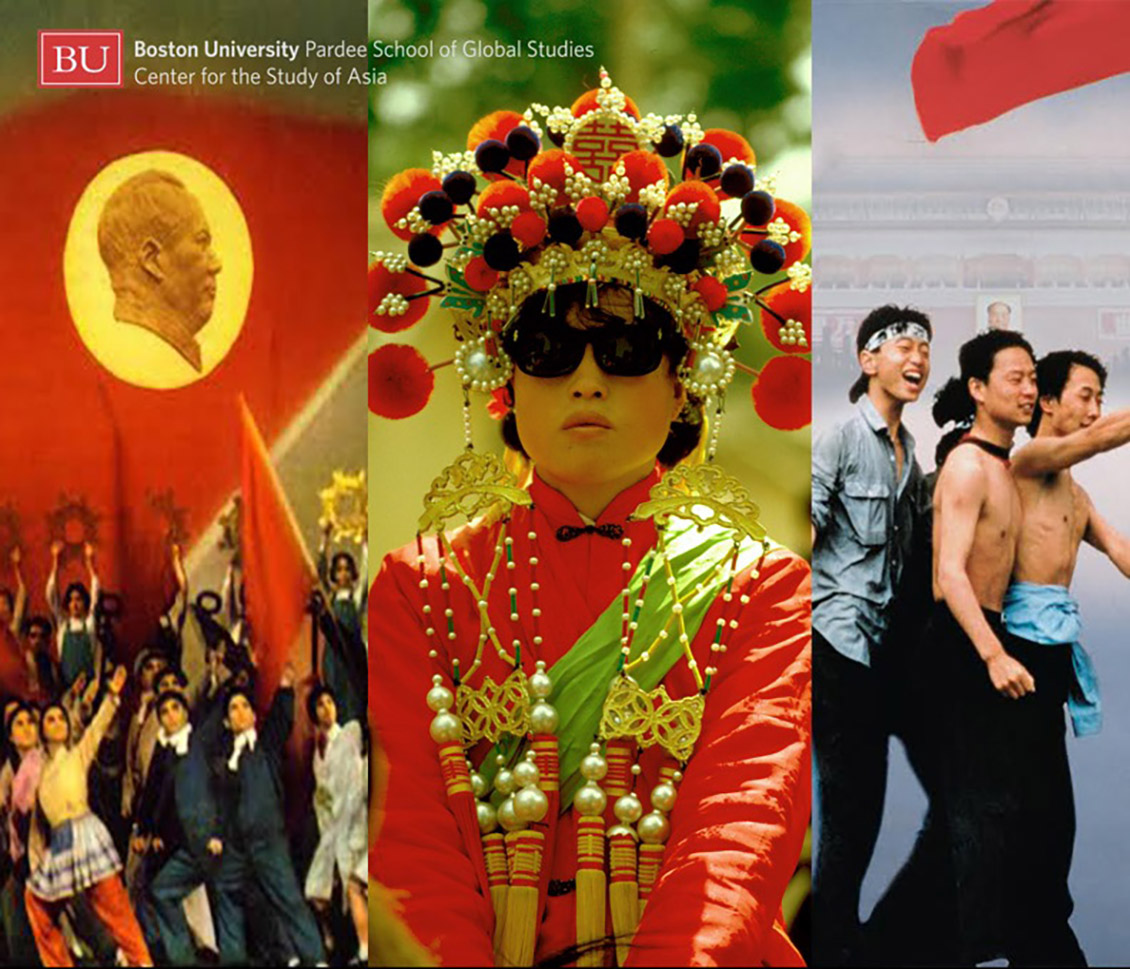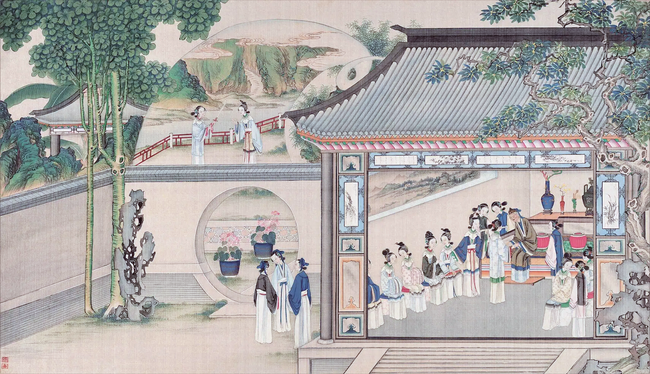History in Images, History in Words: In Search of Facts in Documentary Filmmaking
History in Images, History in Words:
In Search of Facts
in Documentary Filmmaking
A lecture by Carma Hinton
Robinson Professor of Visual Culture and Chinese Studies at George Mason University
Monday April 10, 2017 from 4-7 pm
at the Photonics Center (9th fl.), 8 St. Mary’s Street, Boston University
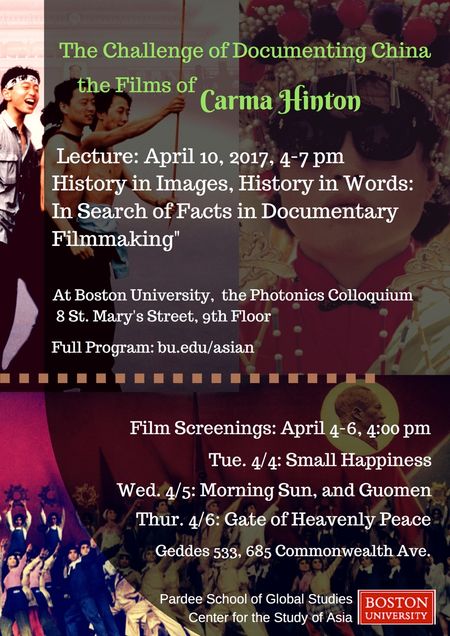 My presentation will focus on the process of documentary filmmaking, especially the many challenges my team and I faced in trying to create engaging filmic narratives that are both factually accurate and encompass multiple perspectives. I will use excerpts from my films as well as out-takes to illustrate the difficulties in determining what information to include and exclude, assess the compromises involved in the choices, and explore the consequences of taking various possible paths. I will also address the different problems that a historian encounters when presenting history in images as opposed to in words: the potential and limitation of each medium and what information each might privilege or obscure. I believe that in this age of “alternative facts” and “parallel universes,” reflections on the challenges in obtaining authenticity and truth and the importance of relentlessly striving to reach this goal, take on particularly urgent meaning.
My presentation will focus on the process of documentary filmmaking, especially the many challenges my team and I faced in trying to create engaging filmic narratives that are both factually accurate and encompass multiple perspectives. I will use excerpts from my films as well as out-takes to illustrate the difficulties in determining what information to include and exclude, assess the compromises involved in the choices, and explore the consequences of taking various possible paths. I will also address the different problems that a historian encounters when presenting history in images as opposed to in words: the potential and limitation of each medium and what information each might privilege or obscure. I believe that in this age of “alternative facts” and “parallel universes,” reflections on the challenges in obtaining authenticity and truth and the importance of relentlessly striving to reach this goal, take on particularly urgent meaning.
About the speaker:
Carma Hinton is an art historian and a filmmaker. She received her Ph.D. in Art History from Harvard University and is now Robinson Professor of Visual Culture and Chinese Studies at George Mason University. Together with Richard Gordon, Hinton has directed many documentary films, including Small Happiness, All Under Heaven, To Taste a Hundred Herbs, Abode of Illusion: The Life and Art of Chang Dai-chien, The Gate of Heavenly Peace, and Morning Sun. She has won two Peabody Awards, the American Historical Association’s John E. O’Connor Film Award, the International Critics Prize and the Best Social and Political Documentary at the Banff Television Festival, and a National News & Documentary Emmy, among others. Hinton is currently working on a book about Chinese scrolls depicting the theme of demon quelling. Carma Hinton was born in Beijing. Chinese is her first language and culture.

Ask the Experts: Roundtable Discussion on Career Paths in Cultural Heritage Management (Thurs. Apr 20, 2023)
The Boston University Archaeology Program, the Antiquities Coalition, and the BU Center for the Study of Asia
invite you to take part in the upcoming roundtable discussion with students,
Ask the Experts: Career Paths in Cultural Heritage Management
Thursday, April 20, 2023 from 12-1:30pm at 121 Bay State Road, Boston University

Are you interested in a possible career in some aspect of cultural heritage management, such as archaeology, museums, art crime, the international trade in looted antiquities, antiquities repatriation, heritage tourism, or related fields?
This roundtable discussion brings together practitioners from many different areas of cultural heritage management who will briefly describe their own career paths and the types of projects and responsibilities they pursue in their work. Students and others who are considering careers in any of these diverse areas are welcome to explore various career paths, ask about college and post-college preparation, and internship and other employment opportunities.
About the Speakers:
Dr. Chris Jasparro is an associate professor in the National Security Affairs Department and director, Africa Regional Studies Group, at the Naval War College. He most recently worked for the U.S. Marine Corps Command and Staff College and Asia-Pacific Center for Security Studies as well as taught for several civilian universities. He has extensive experience as a field archaeologist with additional experience in cartography and geographic analysis for economic, town and transportation planning, and is a specialist in cultural heritage protection in conflict zones. He holds a doctorate in geography from the University of Kentucky, a master’s in geography from the University of North Carolina-Chapel Hill and a bachelor’s in anthropology and geography from the University of Vermont.
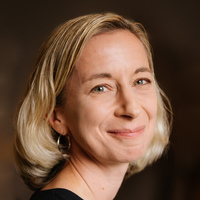 Victoria Reed is the Sadler Curator for Provenance at the Museum of Fine Arts, Boston. She holds her degrees from Rutgers University (Ph.D. and MA), and Sarah Lawrence College, and trained as an art historian specializing in mediaeval and Renaissance art. She has been conducting museum and provenance research since 1997, and is currently responsible for the research and documentation of the provenance of the MFA’s encyclopedic collection, the review of review of potential acquisitions and loans, and the development of due diligence policies and practice throughout the curatorial division. Dr. Reed has lectured widely and published extensively on matters related to provenance research, including the issue of Nazi-era looting and restitution.
Victoria Reed is the Sadler Curator for Provenance at the Museum of Fine Arts, Boston. She holds her degrees from Rutgers University (Ph.D. and MA), and Sarah Lawrence College, and trained as an art historian specializing in mediaeval and Renaissance art. She has been conducting museum and provenance research since 1997, and is currently responsible for the research and documentation of the provenance of the MFA’s encyclopedic collection, the review of review of potential acquisitions and loans, and the development of due diligence policies and practice throughout the curatorial division. Dr. Reed has lectured widely and published extensively on matters related to provenance research, including the issue of Nazi-era looting and restitution.
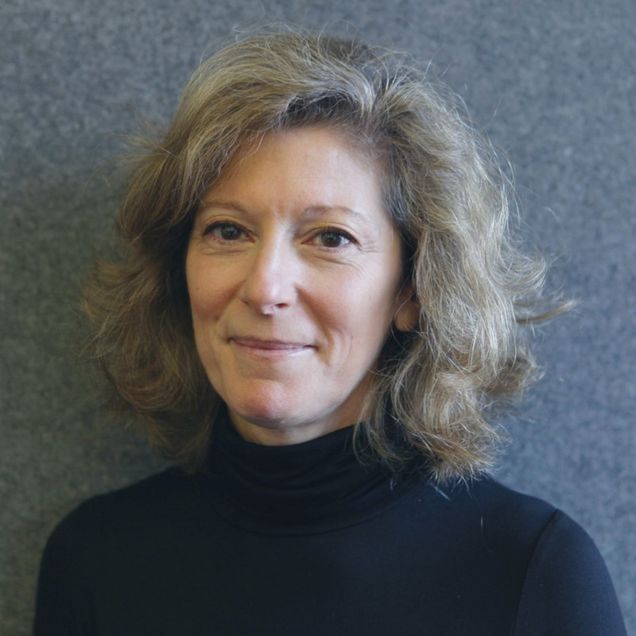 Susan de Menil is currently the founding co-president of the Art, Antiquities, and Blockchain Consortium (AABC), a nonprofit 501(c)3 that uses blockchain-based infrastructure to guide the future of cultural heritage repatriation. Since 1991, Susan has worked as the director of marketing, administration, and interior design for Francois de Menil, Architect, P.C. From 1999-2012, she served as the president and executive director of the Byzantine Fresco Foundation, the nonprofit organization that oversaw the acquisition, conservation, exhibition, stewardship, and return of frescoes that had been taken from the Church at Lysi in Cyprus. During that time, de Menil conducted in-depth ethnographic interviews with the many stakeholders in a complex international negotiation over the frescoes. Susan is the director of the forthcoming documentary on this project, 38 Pieces.
Susan de Menil is currently the founding co-president of the Art, Antiquities, and Blockchain Consortium (AABC), a nonprofit 501(c)3 that uses blockchain-based infrastructure to guide the future of cultural heritage repatriation. Since 1991, Susan has worked as the director of marketing, administration, and interior design for Francois de Menil, Architect, P.C. From 1999-2012, she served as the president and executive director of the Byzantine Fresco Foundation, the nonprofit organization that oversaw the acquisition, conservation, exhibition, stewardship, and return of frescoes that had been taken from the Church at Lysi in Cyprus. During that time, de Menil conducted in-depth ethnographic interviews with the many stakeholders in a complex international negotiation over the frescoes. Susan is the director of the forthcoming documentary on this project, 38 Pieces.
In her research and curatorial work, de Menill co-curated Angels & Franciscans: Innovative Architecture from Los Angeles and San Francisco, an exhibition which was awarded Best Architecture show by the International Association of Art Critics. The catalogue (with Bill Lacey) was published by Rizzoli. She is also co-editor of the book Sanctuary: The Spirit In/Of Architecture based on a symposium at the Menil Collection organized in conjunction with the exhibition Sanctuaries: The Last Works of John Hejduk.
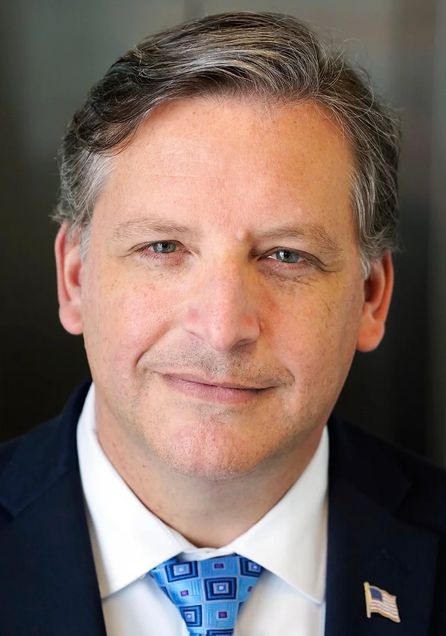 Anthony Amore earned a bachelor's degree in English from the University of Rhode Island and a master’s degree in public administration from Harvard University’s John F. Kennedy School of Government. He also graduated from the Federal Law Enforcement Training Center and completed professional programs in leadership and national security from Harvard University. Amore's professional experience includes working as the director of security and chief investigator at the Isabella Stewart Gardner Museum in Boston, as an officer with the U.S. Immigration Service, as a special agent with the Federal Aviation Administration’s Security Division, and as an author. He was also appointed as assistant federal security director with the U.S. Department of Homeland Security’s Transportation Security Administration. His mission in that appointment included rebuilding security at Logan Airport after the attacks of 9/11.
Anthony Amore earned a bachelor's degree in English from the University of Rhode Island and a master’s degree in public administration from Harvard University’s John F. Kennedy School of Government. He also graduated from the Federal Law Enforcement Training Center and completed professional programs in leadership and national security from Harvard University. Amore's professional experience includes working as the director of security and chief investigator at the Isabella Stewart Gardner Museum in Boston, as an officer with the U.S. Immigration Service, as a special agent with the Federal Aviation Administration’s Security Division, and as an author. He was also appointed as assistant federal security director with the U.S. Department of Homeland Security’s Transportation Security Administration. His mission in that appointment included rebuilding security at Logan Airport after the attacks of 9/11.
An internationally recognized expert in the security realm, Anthony Amore has also worked in homeland security field at the federal level in aviation and facility security as well as immigration enforcement. He has lectured in homeland security at the college level in and provides commentary on security and terrorism issues for a wide-range of local and national media outlets. He is also an expert in matters related to security fine art and in the theft of highly-valuable property, including rare masterpieces. He is one of the world's top experts in the field of stolen art investigations. Anthony is the best-selling author of "Stealing Rembrandts" (2011). His second book, "The Art of the Con," was published in 2015 and was a New York Times Best Seller in Crime. His book "The Woman Who Stole Vermeer: The True Story of Rose Dugdale and the Russborough House Art Heist ” was published in 2020.
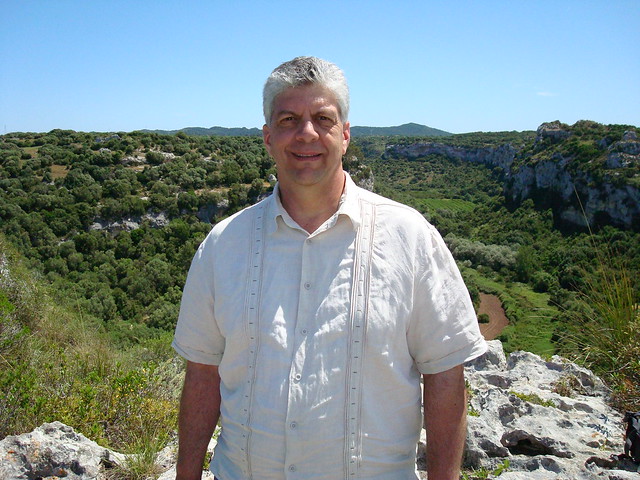 Ricardo Elia is Associate Professor of Archaeology in the College of Arts and Sciences, Boston University. Over the course of four decades, Prof. Elia has trained many undergraduate and graduate students in international archaeological heritage management, U.S. cultural resource management, archaeology and the law, archaeological ethics, public archaeology, heritage and armed conflict, and looting and the antiquities market. His current research focuses on the “monuments men” and women of the Japanese Occupation, 1945–1952.
Ricardo Elia is Associate Professor of Archaeology in the College of Arts and Sciences, Boston University. Over the course of four decades, Prof. Elia has trained many undergraduate and graduate students in international archaeological heritage management, U.S. cultural resource management, archaeology and the law, archaeological ethics, public archaeology, heritage and armed conflict, and looting and the antiquities market. His current research focuses on the “monuments men” and women of the Japanese Occupation, 1945–1952.
Organizers:
 Terressa (Tess) Davis, a lawyer and archaeologist by training, is Executive Director of the Antiquities Coalition. She oversees the organization’s work to fight cultural racketeering and also manages the day-to-day operations of the institute’s staff in Washington, DC, as well as programs overseas.
Terressa (Tess) Davis, a lawyer and archaeologist by training, is Executive Director of the Antiquities Coalition. She oversees the organization’s work to fight cultural racketeering and also manages the day-to-day operations of the institute’s staff in Washington, DC, as well as programs overseas.
Since 2013, Davis has been affiliated with the Scottish Centre for Crime and Justice Research, at the University of Glasgow. She came to Scotland from the Lawyers’ Committee for Cultural Heritage Preservation — a not-for-profit institution based in Washington, DC — where she was Executive Director until 2012. She previously worked for the nongovernmental organization Heritage Watch in Cambodia, first as Project Coordinator, and finally Assistant Director. Her career began at the Archaeological Institute of America.
Over the last decade, Davis has conducted extensive field research on the illicit trade in Cambodian antiquities, as well as legal research on the kingdom’s cultural property law. She also conceptualized and implemented a number of exciting projects in the country, including an exhibition at Angkor Wat about threats facing the temple, a hotline for the public to report archaeological discoveries or looting, and a children’s book entitled “If the Stones Could Speak.” From 2012-2014, she directed a legal internship program in Phnom Penh for international students from the Tulane-Siena Institute, who assist the Cambodian Ministry of Culture and Fine Arts with their legal needs.
Davis has been a legal consultant for the Cambodian and US governments and works with both the art world and law enforcement to keep looted antiquities off the market. She writes and speaks widely on these issues — having been published in the New York Times, Wall Street Journal, the Los Angeles Times, CNN, the Huffington Post, and various scholarly publications — and featured in documentaries.
After graduating magna cum laude from Boston University with a Bachelor of Arts in Archaeology, Davis earned her Juris Doctor from the University of Georgia School of Law. She now serves on the Board of Directors at the Council on Library and Information Resources (CLIR) and the Advisory Boards of Heritage Watch and the Ocean Foundation. She is admitted to the New York State Bar.
In 2015, the Royal Government of Cambodia knighted Davis for her work to recover the country’s plundered treasures, awarding her the rank of Commander in the Royal Order of the Sahametrei.

Robert E. Murowchick is Lecturer and Director of Undergraduate Studies in Boston University's Archaeology Program. His archaeological research interests have focused primarily on early Bronze Age urbanism in the Shang culture in the North China Plain; the development of early bronze metallurgy in south and southwest China and northern Vietnam; and the Asian antiquities trade. His current research examines the potential uses of satellite imagery and archival aerial photography in the exploration of the historic Jewish community in the ancient Chinese capital city of Kaifeng.
The Gastropolitics of the 1853-54 Perry Mission to Japan, with Christine Guth (Apr. 26, 2023)
BU's Department of History of Art and Architecture, American and New England Studies Program, and the BU Center for the Study of Asia
invite you to our upcoming lecture
The Gastropolitics of the 1853-54 Perry Mission to Japan
Christine M.E. Guth
(Royal College of Art / Victoria and Albert Museum)
Wednesday April 26, 2023 from 5:30-7:00 pm
at the Frederick S. Pardee School of Global Studies, 121 Bay State Road, Boston, MA 02215
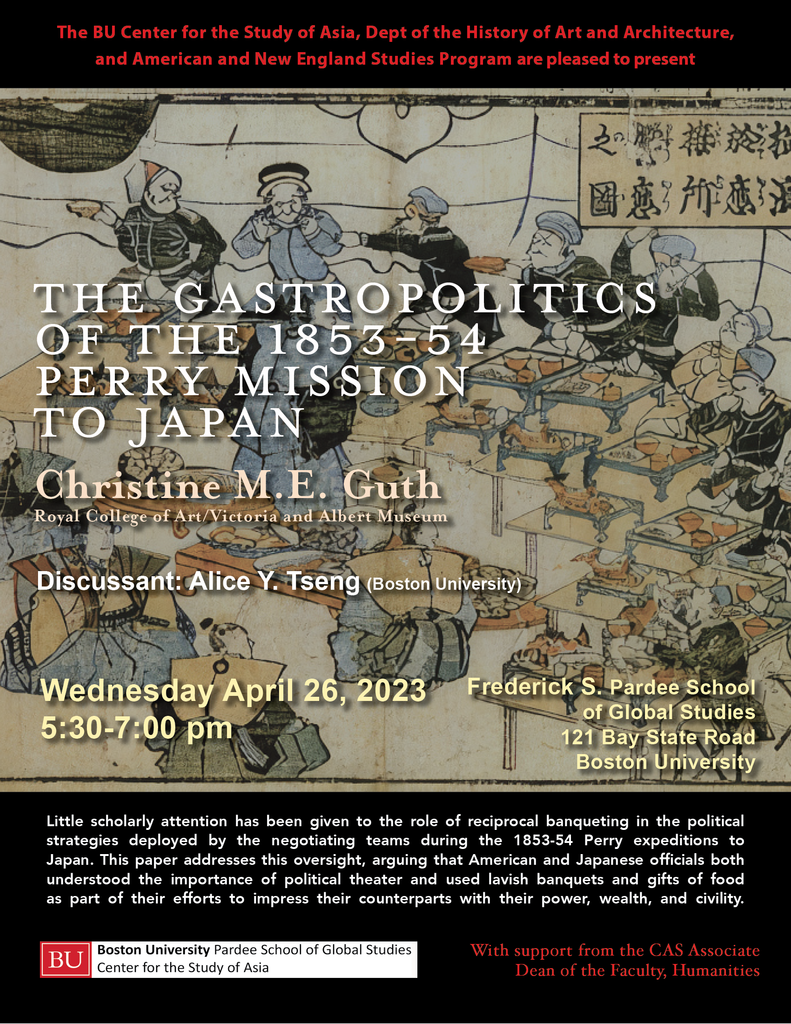
Poster illustration shows a detail from “Entertainment and Menu for Reception at Yokohama 1854” (Peabody Essex Museum M17,143. Salem, MA)
Abstract:
Little scholarly attention has been given to the role of reciprocal banqueting in the political strategies deployed by the negotiating teams during the 1853-54 Perry expeditions to Japan. This paper addresses this oversight, arguing that American and Japanese officials both understood the importance of political theater and used lavish banquets and gifts of food as part of their efforts to impress their counterparts with their power, wealth, and civility.
About the Speaker:
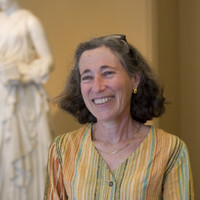 Christine M. E. Guth has taught at institutions including Princeton, Harvard, University of Pennsylvania, and Berkeley. She led the Asian specialism in the Victoria and Albert Museum & Royal College of Art’s Post-graduate History of Design Program from 2007 until 2016. She has written widely about transnational cultural exchange between the United States and Japan. Her books include Longfellow’s Tattoos: Tourism, Collecting, and Japan (2004); and Hokusai’s Great Wave: Biography of a Global Icon (2015). Her publications on culinary topics include: “The Japanese Stand Today as Teachers of the Whole World’ American Food Reform and the Russo-Japanese War,” (2021) and “Food for Fantasy: Sara Bosse and Onoto Watanna’s 1914 Chinese-Japanese Cookbook (2021).
Christine M. E. Guth has taught at institutions including Princeton, Harvard, University of Pennsylvania, and Berkeley. She led the Asian specialism in the Victoria and Albert Museum & Royal College of Art’s Post-graduate History of Design Program from 2007 until 2016. She has written widely about transnational cultural exchange between the United States and Japan. Her books include Longfellow’s Tattoos: Tourism, Collecting, and Japan (2004); and Hokusai’s Great Wave: Biography of a Global Icon (2015). Her publications on culinary topics include: “The Japanese Stand Today as Teachers of the Whole World’ American Food Reform and the Russo-Japanese War,” (2021) and “Food for Fantasy: Sara Bosse and Onoto Watanna’s 1914 Chinese-Japanese Cookbook (2021).
About the Discussant:
Alice Y. Tseng is CAS Associate Dean of the Faculty for the Humanities and Professor of Japanese Art and Architecture at Boston University. She specializes in the art and architecture of Japan, with particular focus on the 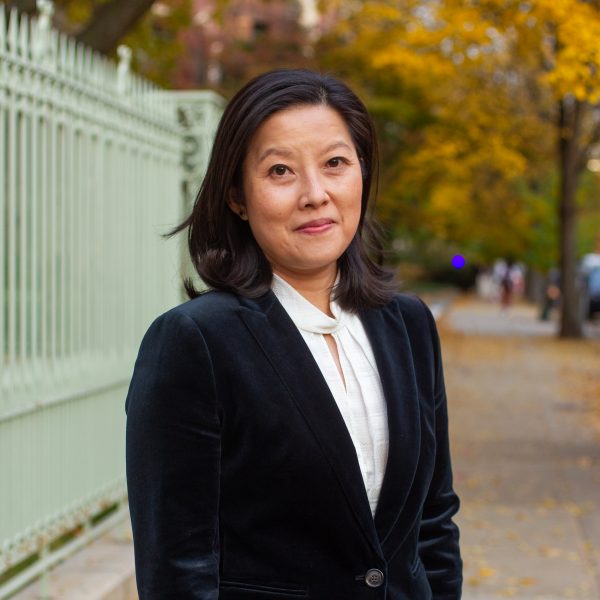 19th and 20th centuries. Specific topics of research interest are the history of institutional buildings, collections, and exhibitions; transnational and transcultural connections between Japan and Euro-America; the role of the visual arts in cultural transformation, invention, and revival; and the visual and spatial representations of Japan’s modern monarchy. She is the author of The Imperial Museums of Meiji Japan: Architecture and the Art of the Nation (2008), Kyoto Visual Culture in the Early Edo and Meiji Periods: The Arts of Reinvention (co-edited with M. Pitelka, 2016), and Modern Kyoto: Building for Ceremony and Commemoration, 1868-1940 (2018). She is a co-curator of the online exhibition Asia at the World’s Fairs. A current book project, tentatively titled “Designing for World’s View: Japan at the Louisiana Purchase Exposition of 1904,” examines the production of Japanese national displays through ensembles of specialized pavilions, gardens, tableaux, models, and maps at the international exposition. Another ongoing project explores the twinned concepts of emperor and empire and their manifestations in built environments.
19th and 20th centuries. Specific topics of research interest are the history of institutional buildings, collections, and exhibitions; transnational and transcultural connections between Japan and Euro-America; the role of the visual arts in cultural transformation, invention, and revival; and the visual and spatial representations of Japan’s modern monarchy. She is the author of The Imperial Museums of Meiji Japan: Architecture and the Art of the Nation (2008), Kyoto Visual Culture in the Early Edo and Meiji Periods: The Arts of Reinvention (co-edited with M. Pitelka, 2016), and Modern Kyoto: Building for Ceremony and Commemoration, 1868-1940 (2018). She is a co-curator of the online exhibition Asia at the World’s Fairs. A current book project, tentatively titled “Designing for World’s View: Japan at the Louisiana Purchase Exposition of 1904,” examines the production of Japanese national displays through ensembles of specialized pavilions, gardens, tableaux, models, and maps at the international exposition. Another ongoing project explores the twinned concepts of emperor and empire and their manifestations in built environments.
Dream of the Red Chamber: The Fifth Annual WLL Big Fat Books Symposium (Apr. 28-29, 2023)
Cao Xueqin’s Story of the Stone / Dream of the Red Chamber
The Fifth Annual WLL Big Fat Books Symposium
Conference Program – Friday-Saturday, April 28-29, 2023 Barrister’s Hall, BU School of Law, 765 Commonwealth Avenue


The eighteenth-century Chinese novel Dream of the Red Chamber (Hongloumeng 紅樓夢), also known as The Story of the Stone, by Cao Xueqin, is one of the great works of world literature. With its great length and its numerous characters and subplots, the book offers a complex picture of love, desire, ambition and loss. It is about a family; it is about a group of teenagers growing up within a family compound in the Grand Prospect Park garden; and it is also about the dual aspect of all things, including truth and falsehood, illusion and reality, heaven and earth. The novel has spoken to generations of readers in the Chinas and internationally, and it continues to do so today.
Please join us for a day and a half of cross-disciplinary conversation as we celebrate this novel in the fifth iteration of our Big Fat Books conference series.
Location: Barrister’s Hall, on Boston University's Charles River Campus
Barrister’s Hall is located on the first floor of the School of Law building (765 Commonwealth Avenue), toward the rear of the building (see red marker on map below). Please note that although the Law School building has a Commonwealth Avenue address, it is actually set back from Commonwealth Avenue, behind and to the left of Marsh Plaza.
Sponsored by:
Boston University Center for the Humanities
Boston University Center for the Study of Asia
Boston University College of Fine Arts
Boston University Arts Initiative
Han Suyin Foundation
NEH Distinguished Teaching Professor
CAS Associate Dean of Humanities
Department of World Languages and Literatures
Department of English
BUCSA Spring Reception (Thursday, May 4, 2023)
Come celebrate the conclusion of another successful year with your colleagues, students, and friends! Join us for the
BUCSA Spring Reception
on Thursday, May 4, 2023 from 5:00 to 6:30 pm
at the Pardee School of Global Studies, 121 Bay State Road, Boston.
Refreshments will be provided. So that we can better estimate our food and refreshment needs,
please RSVP hereor use the QR code in the poster below.
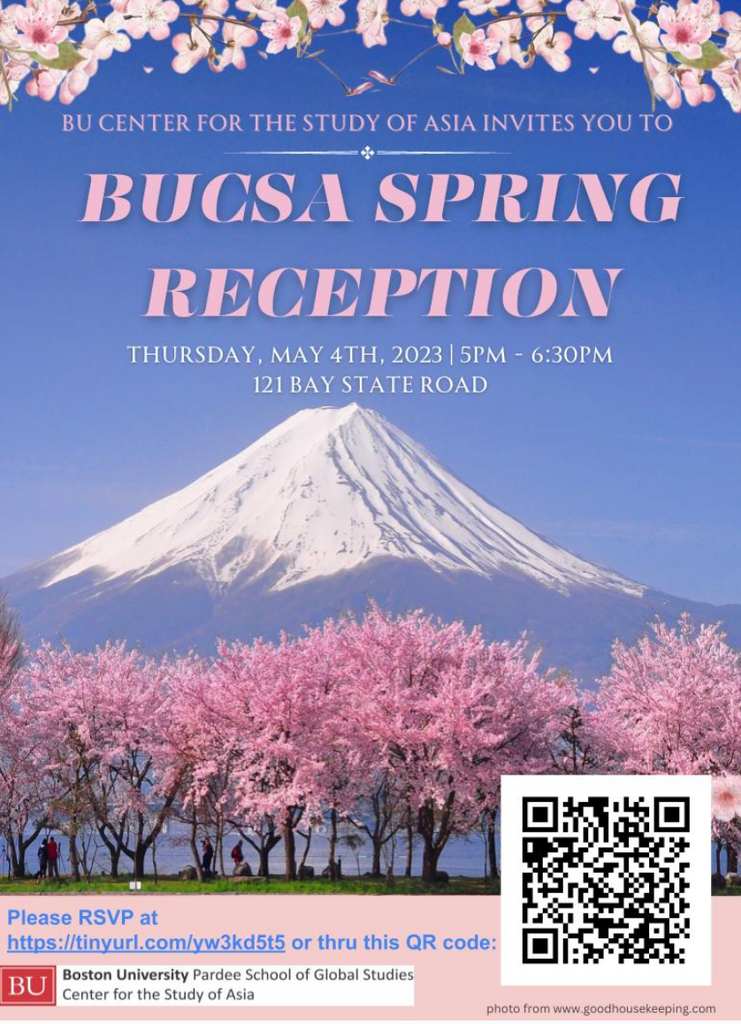

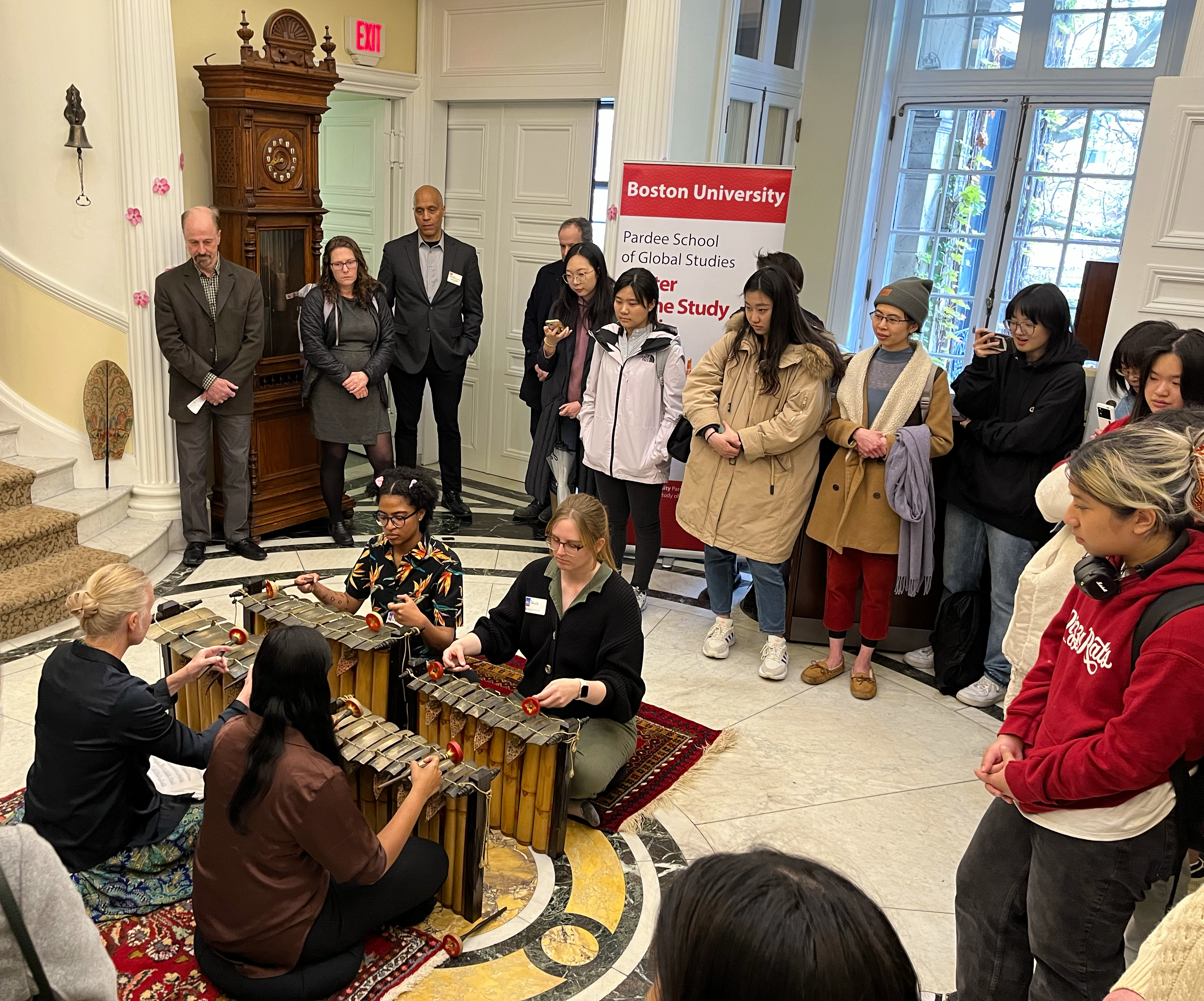
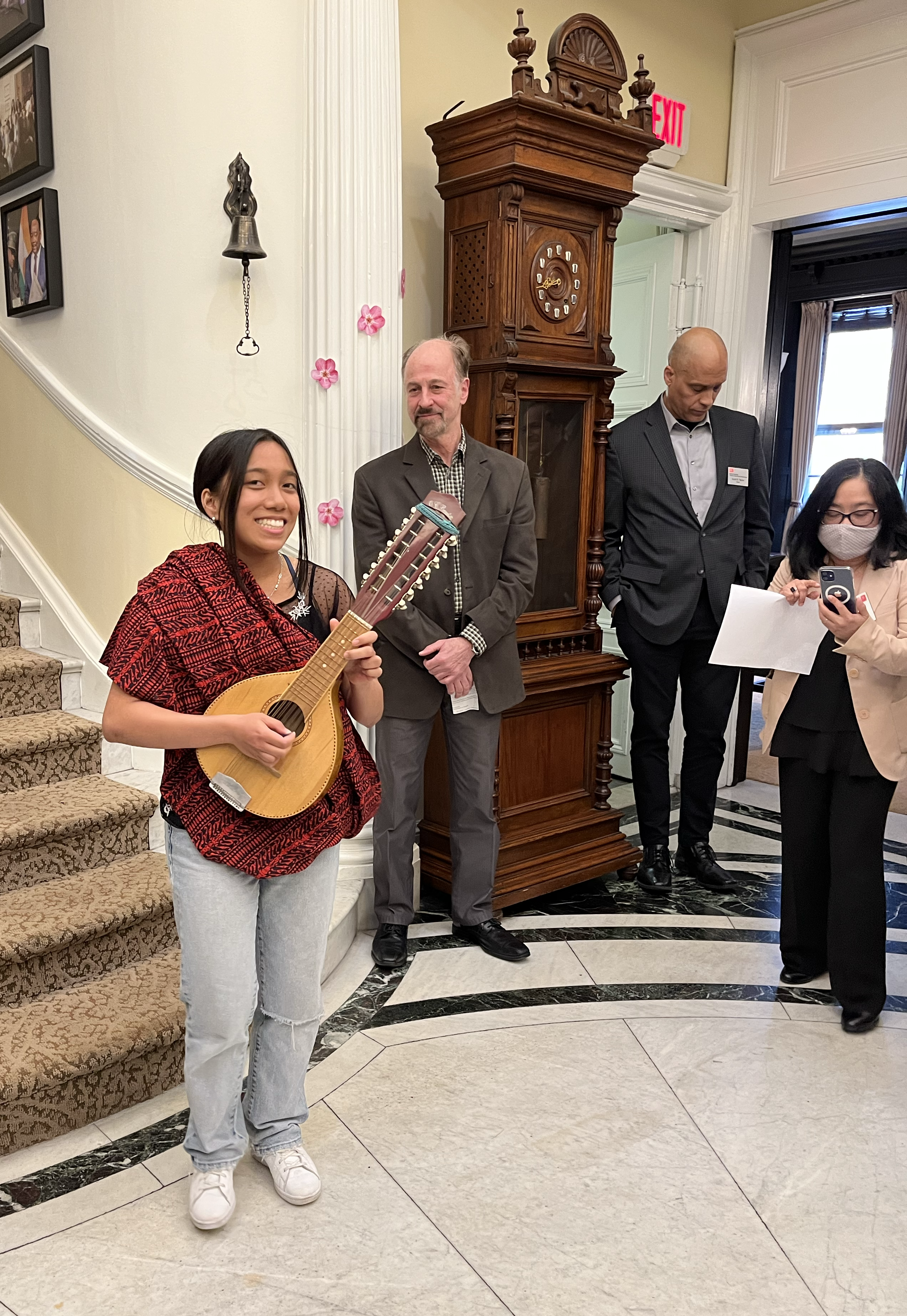
Harvard Gender Studies Workshop “The Chinese Family Romance” (at Harvard, May 5 2023)
The Harvard Fairbank Center for Chinese Studies invites you to attend the 2023 Gender Studies Workshop
The Chinese Family Romance
May 5 2023, from 9:00 am to 1:00 pm
CGIS South S020, Belfer Case Study Room, Harvard University
1730 Cambridge Street, Cambridge MA 02138

Speakers:
Emma Jinhua Teng, MIT
Ting Guo, The Chinese University of Hong Kong
Yangyang Cheng, Yale University
Carlos Rojas, Duke University
Eileen Cheng-yin Chow, Duke University
Jie Li, Harvard University
Tina Lu, Yale University
Organizers:
Eileen Cheng-yin Chow, Duke University
Wai-Yee Li, Harvard University
Ellen Widmer, Wellesley College
Xu Man, Tufts University
Catherine Yeh, Boston University
Schedule of Events
9:00-9:15 “The Chinese Family Romance” – opening remarks by Eileen Cheng-yin Chow
9:15-9:45 Emma Jinhua Teng (MIT)
“Transnational and Interracial Family Romance: Rethinking Chinese mixed race in the early 20th Century“
9:45-10:15 Ting Guo (The Chinese University of Hong Kong)
“Daddy Supreme: Gender Politics and the Reinvention of Confucianism in Contemporary China” (via zoom)
10:15-10:45 Yangyang Cheng (Yale)
“‘Of the Virus and God, Orange Peels and the Party’ — A Transnational Chinese Family during Covid-19”
10:45-11:15 Carlos Rojas (Duke)
“Chen Xue and Taiwanese Queer Family Narratives”
11:15-11:45 Eileen Cheng-yin Chow (Duke)
“Family/stories/dispersal: everything, everywhere, all at once”
11:45-12:30 Roundtable
Moderated by Jie Li (Harvard) and Tina Lu (Yale), and including China Gender Studies Workshop conveners Wai-yee Li, Xu Man, Catherine Yeh, Ellen Widmer, and all participants

Yangyang Cheng is a Research Scholar in Law and Fellow at Yale Law School’s Paul Tsai China Center, where her work focuses on the development of science and technology in China and US‒China relations. Her essays on these and related topics have appeared in The New York Times, The Guardian, The Atlantic, The New Statesman, WIRED, VICE, MIT Technology Review, Los Angeles Review of Books, and many other publications, and have received awards from the Society of Publishers in Asia (SOPA), Asian American Journalists Association (AAJA), and Bulletin of the Atomic Scientists. Born and raised in China, Cheng received her PhD in physics from the University of Chicago and her bachelor’s from the University of Science and Technology of China’s School for the Gifted Young. Before joining Yale, she worked on the Large Hadron Collider (LHC) for over a decade, most recently at Cornell University and as an LHC Physics Center Distinguished Researcher at Fermi National Accelerator Laboratory. https://law.yale.edu/yangyang-cheng

Eileen Cheng-yin Chow has worked as a cram school English teacher, literary translator, book designer, fudge and candy maker, conference interpreter, short order cook, magazine photographer, film subtitler, and lowly PA on set for Warner Brothers and Beijing Film Studios.
Eileen is currently Associate Professor of the Practice in the Department of Asian and Middle Eastern Studies, and Director of Graduate Studies of the Asian/Pacific Studies Institute at Duke University. Additionally at Duke, Eileen is a founding/core faculty member in the Asian American Diaspora Studies Program, the first such program in the U.S. South; and is the founding director of Duke Story Lab, a humanities lab dedicated to the study of stories and the communities that coalesce around them. Elsewhere, she is Director of the Shewo Institute of Chinese Journalism at Shih Hsin University in Taipei, Taiwan, and serves on the editorial boards of Biographical Literature, the LA Review of Books, Asia Society’s China Books Review, and Third State Books; and with Carlos Rojas, is co-editor of the Sinotheory book series for Duke UP. Eileen’s teaching and research interests include literature, film and visual studies, popular culture (anime/manga, fandoms, media technologies), diaspora studies, and the histories of Chinatowns around the world. Academic details at https://scholars.duke.edu/person/eileen.chow; or find her @chowleen on Twitter.

Ting Guo is Assistant Professor of Cultural and Religious Studies, Chinese University of Hong Kong, focusing on religion, politics, and gender in transnational Asia. She is writing her first book, Politics of Love: Religion, Secularism, and Love as a Political Discourse in Modern China. She co-hosts a Mandarin podcast called 時差 in-betweenness (@shichapodcast). https://www2.crs.cuhk.edu.hk/faculty-staff/teaching-faculty/guo-ting

Jie Li is a professor of East Asian Languages and Civilizations at Harvard University. She is the author of Shanghai Homes: Palimpsests of Private Life and Utopian Ruins: A Memorial Museum of the Mao Era. She also co-edited Red Legacies in China: Cultural Afterlives of the Communist Revolution. Her forthcoming book is entitled Cinematic Guerrillas: Propaganda, Projectionists and Audiences in Socialist China. She is now working on a cultural history of radios, loudspeakers, and noise in twentieth-century China. https://ealc.fas.harvard.edu/people/jie-li

Carlos Rojas teaches modern Chinese cultural studies at Duke University. He is Professor of Chinese Cultural Studies; Gender, Sexuality, and Feminist Studies; and Arts of the Moving Image. Full bio: https://scholars.duke.edu/person/c.rojas

Emma J. Teng is the T.T. and Wei Fong Chao Professor of Asian Civilizations at MIT. She teaches classes in Chinese culture, Chinese migration history, Asian American history, East Asian culture, and women’s and gender studies.
For full bio: https://history.mit.edu/people/emma-teng/
TODAY! US-China Competition: Revisionism, Containment and Prospects, with Prof. Robert Ross (Thursday, Dec. 8, 2022)
The BU Center for the Study of Asia invites you to a lecture and discussion on
US-China Competition: Revisionism, Containment and Prospects
Prof. Robert Ross (Boston College)
Thursday Dec. 8, 2022 from 5-6:30 pm ET
Frederick S. Pardee School of Global Studies, 121 Bay State Road

 Speaker:
Speaker:
Robert Ross, Professor of Political Science at Boston College, and Associate, John King Fairbank Center for Chinese Studies, Harvard University. His recent publications include Chinese Security Policy: Structure, Power and Politics and Strategic Adjustment and the Rise of China: Power and Politics in East Asia.
 Discussant:
Discussant:
Joe Fewsmith, Professor of International Relations and Political Science at Boston University's Frederick S. Pardee School of Global Studies. His recent publications include Forging Leninism in China: Mao and the Remaking of the Chinese Communist Party, 1927-1934 (2022) and Rethinking Chinese Politics (2021).

Conservation in Action: Japanese Buddhist Sculpture in a New Light (At the Boston MFA) Closing Soon! See it before December 31, 2022)
A rare, behind-the-scenes look at the conservation of seven Buddhist sculptures
Visitors are invited to watch as objects conservators study and treat seven Japanese Buddhist sculptures in a public conservation studio. The wooden figures—images of worship depicting Buddhas, Guardian Kings, and a Wisdom King—are decorated with polychromy or gilding and date from the 9th to the 12th centuries. The conservation project occupies an entire gallery in the Museum, allowing visitors to observe the techniques employed by objects conservators as they carefully clean the sculptures and secure areas of loose paint, lacquer, and gilding. The sculptures have been relocated from the Museum's beloved Japanese Buddhist Temple Room, where they normally reside, enabling museum-goers to see the objects in a new setting for the first time in decades. Also on exhibit are three sculptures from storage that serve as points of comparison to exemplify different sculptural techniques, styles, and states of preservation.
The public studio also provides a space for conservators and curators to look closely at the sculptures in collaboration with the Museum's research scientists, identifying the original artists' materials, documenting early restorations, and working with wood anatomists in Japan to confirm the wood identifications. When the project is complete, the sculptures will return to the refurbished Japanese Buddhist Temple Room.

Follow our progress at #mfaconservation, and for an in-depth look at this conservation project, see Conservation in Action.
- Walter Ames Compton, MD Gallery (Gallery 280)
Sponsors

Renovation of the Buddhist Temple Room and “Conservation in Action: Japanese Buddhist Sculpture in a New Light” are generously supported by the Vance Wall Foundation, the Massachusetts Cultural Council, Lisbeth Tarlow and Stephen Kay, Bettina Burr, and Dainippon Sumitomo Pharma Co. Ltd.
Conservation in Action is sponsored by Bank of America.
[This description is taken from https://www.mfa.org/exhibitions/conservation-in-action-japanese-buddhist-sculpture-in-a-new-light]
Kimono Style: The John C. Weber Collection (Metropolitan Museum of Art, through Feb. 20, 2023)
This exhibition will trace the transformation of the kimono from the late Edo period (1615–1868) through the early 20th century, as the T-shaped garment was adapted to suit the lifestyle of modern Japanese women. It will feature a remarkable selection of works from the renowned John C. Weber Collection of Japanese art that explore the mutual artistic exchanges between the kimono and Western fashion, as well as highlights from The Costume Institute’s collection.
The weaving, dyeing, and embroidery techniques for which Japan is famed reached their peak of artistic sophistication during the Edo period. Members of the ruling military class were the primary consumers of sumptuous kimono, each one being custom-made. At the same time, a dynamic urban culture emerged, and the merchant class used its wealth to acquire material luxuries. Kimono, one of the most visible art forms, provided a way for the townspeople to proclaim their aesthetic sensibility. Depictions of kimono in Japanese woodblock prints were widely studied by Western couturiers in the late 19th century. The garment’s comparatively loose, enveloping silhouette, and its rectilinear cut would have the most profound and lasting influence on Western fashion, with couturiers like Madeleine Vionnet and Cristóbal Balenciaga taking inspiration from the kimono for their avant-garde creations.
In the Meiji period (1868–1912), Western clothing was introduced to Japan. Simultaneously, modernization and social changes enabled more women to gain access to silk kimonos than ever before. Around the 1920s, affordable ready-to-wear kimono (meisen) became very popular and reflected a more Westernized lifestyle. These were sold in department stores modelled on Western retailers, following Western-style marketing strategies. To illustrate these connections, the exhibition will present over 60 kimonos alongside Western garments, paintings, prints, and decorative art objects.
Accompanied by a catalogue.
https://www.metmuseum.org/exhibitions/listings/2022/kimono-style

Exhibition Catalogue
This volume explores the untold modern history of the Japanese kimono and its dynamic relationship to Western culture.
One Finger, One Road: Political Journeys in Contemporary Chinese Art. Profs. Shelley Drake Hawks and Sasha Su-Ling Welland (Friday, Nov. 18, 2022 via Zoom webinar)
The Asian Studies Development Program at Middlesex Community College
is pleased to invite you to take part in a free half-day workshop featuring
Dr. Shelley Drake Hawks (Middlesex Community College) and Dr. Sasha Su-Ling Welland (University of Washington).
The interplay of art and politics has a long history in China. This half-day workshop will explore their relationship at two critical junctures in recent Chinese history: in the years leading up to the Cultural Revolution and in those following the launch of China's ambitious One Belt One Road Initiative. This online program will include both lectures and discussions and is free for registered participants.
Friday, November 18, 2022 2:00 to 4:00 pm ET
Register here to receive the Zoom link
https://eastwestcenter.zoom.us/webinar/register/WN_rLwV8qL9QvmLJzKhWlmsIA

BUCSA Asian Studies Holiday Party! Join us Monday, Dec. 5, 2022 at 121 Bay State Road, Boston University

For planning purposes, please RSVP with the QR code or click here

